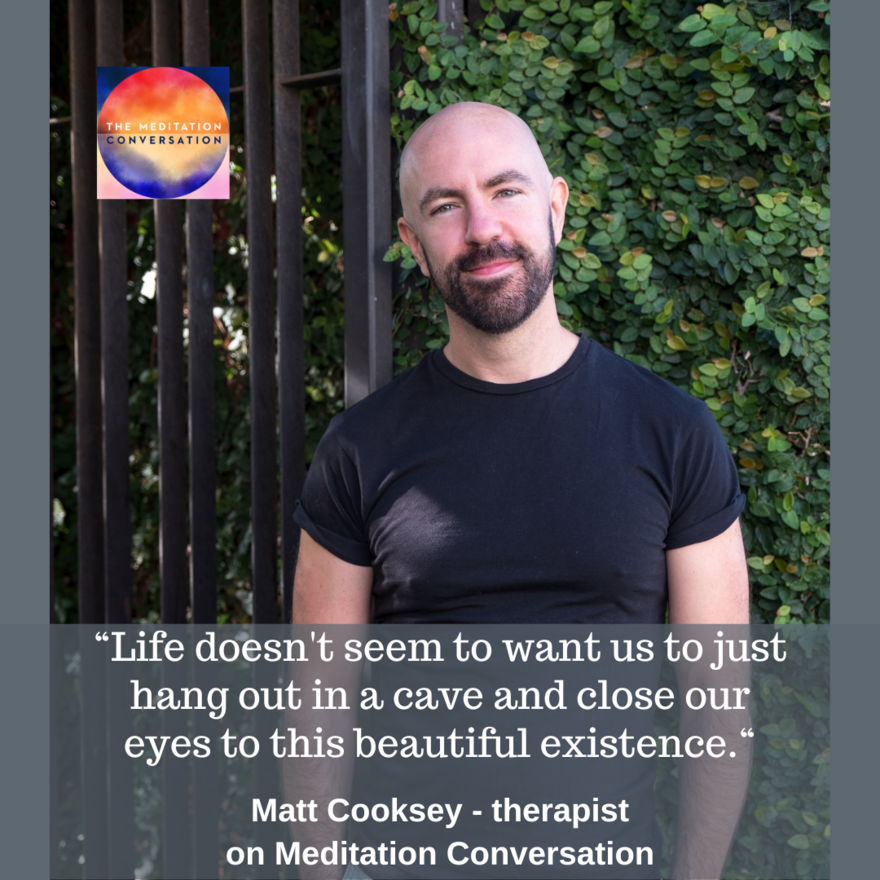
Understanding the intricate relationship between psychology and spirituality is a vital step in the journey of self-discovery and personal growth. As we delve into this exploration, we begin to realize that these two aspects of our experiences are not separate entities but intimately interconnected facets that shape our worldview. Merging these two perspectives provides a holistic approach, helping us embrace our shadows and traumas, often overlooked in spiritual practices. This deeper understanding allows us to navigate uncharted territories within our psyche, leading to a more integrated and authentic self. Realizing this truth has profound implications not just for our individual spiritual journey, but also how we relate to others professionally and personally.
In the world of therapy and personal growth, Matt Cooksey is not your ordinary guide. He champions the unconventional idea of mapping the psyche to aid self-exploration, integrating psychology and spirituality. An accomplished therapist, Matt is on a mission to help individuals reconcile their inner light and darkness; inspiring them to see their supposed flaws as the implicit facets of their misunderstood genius. Drawing from his own journey of transformation and the wisdom of numerous schools of thought, Matt provides a cohesive interrelationship between our mental and spiritual selves. His ability to empower, through relatability and transparency, makes him both an inspirational and empathetic figure within this profound dialogue.

Let's explore 5 tips that Matt highlights in this episode for merging psychology and spirituality in the highest way:
-
Embracing the Darkness: The Power of Acceptance
-
Merging Psychology and Spirituality: A New Approach
-
Spiritual Bypassing: Avoiding the Pitfall
-
Unveiling the Psyche: The Power of Mapping
-
Life's Spiral Staircase: Embracing the Journey of Growth
1. Embracing the Darkness: The Power of Acceptance
Transformation often comes from encountering and accepting the darker parts of our own psyche. The path towards true self-knowledge and spiritual growth is rarely easy or linear, and the journey typically involves facing, understanding, and integrating aspects of our self which may initially seem fearful, uncomfortable, or even seemingly insurmountable. One powerful approach which can aid this process of self-discovery is the mapping of the psyche, a concept central to Matt Cooksey's work. By creating a visual representation of the complex, diverse parts which constitute one's self, individuals can start cultivating a deeper understanding of their mental landscape and the various entities that inhabit it.
During our conversation, Matt shared his own experiences, underscoring how this practice of psyche-mapping has proven transformational in his own journey. Faced with a loss of a longstanding relationship and a shattering of his identity, he found himself at a pivotal juncture. It was in this moment of deep crisis that he courageously chose to sit with and explore his pain, rather than run from it. Through this process, he intimately encountered his darker self and learned to understand, rather than fear it.
His journey to Bali was yet another turning point, where he discovered that surrender goes beyond mere acquiescence. It’s a dance between acceptance and action, a fine balance that takes wisdom to master. The key takeaway from this is essential for anyone on a path towards self-discovery and spiritual growth. Often, it’s in our darkness, in the very things we typically turn away from, that we find our untapped potential for personal evolution and self-understanding. By exploring and integrating these elements into the broader consciousness, we can undergo deep transformations. Without doing so, we may find ourselves in a perpetual cycle of "spiritual bypassing," a state in which we try to transcend our suffering without truly dealing with it. Embracing our darkness and the lessons it offers, walking the spiral staircase of continuous personal growth, and surrendering to the truth of our existence, offers a richer, more authentic existence. This is crucial, not only for personal transformation but also for fostering deeper connections with others and the world around us. The challenge and the opportunity lie in the willingness to step into the exploration of the self in its wholeness, both light and shadow co-existing in harmony.
2. Merging Psychology and Spirituality: A New Approach
In today's world, it's becoming increasingly clear that we must find a balance between our psychological and spiritual aspects if we want to achieve genuine personal growth. These two threads, often considered separate, actually weave together to form a robust tapestry that represents the human psyche. The integration of psychology and spirituality forms a comprehensive approach that transcends the conventional boundaries of personal development. This fusion results in a broader and more profound understanding of ourselves, opening the doorway to uncharted parts of our psyche. It is similar to thoughtful stitching, as we aim to weave together separate strands to form a purposeful and meaningful narrative of personal development.
Taking a deeper dive, Matt enhances our understanding of this integration. He emphasizes the importance of treating both elements - psychology and spirituality - as interdependent entities, rather than isolated silos. Psychology often centers around our ego, traumas, and other aspects of our mental health while spirituality can overlook the human experience, focusing on higher planes of existence. Matt's perspective of a holistic approach implies the wholesome incorporation of both elements, giving us a far more comprehensive toolkit for navigating our inner world.
During the conversation, we also address "spiritual bypassing" - or the propensity to avoid confronting our wounds and traumas by trying to transcend them prematurely. It is crucial that we face our shadows, embrace our traumas, and embark on a journey of self-discovery with confidence. We are complex beings with diverse emotions, experiences, beliefs, aspirations, and contradictions. Each of these elements plays a critical role in defining who we are. However, if we only address these components in isolation, we risk having a fragmented understanding of ourselves, which can lead to inner turmoil, difficulties in decision-making, and an overall sense of being lost. It can also stifle our personal growth, as we may find ourselves stuck in repetitive patterns without realizing why. As such, integrating psychology and spirituality is not a luxury; it's a necessity for personal growth and self-exploration. By doing so, we can understand ourselves better and move towards authentic wholeness.
3. Spiritual Bypassing: Avoiding the Pitfall
In our fast-paced and often disconnected world, the quest for authenticity and wholeness is more important than ever. Recognizing and integrating the various aspects of our personalities holds the key to true self-discovery and profound transformation.
Spiritual bypassing is a common pitfall on the path. It's an avoidance strategy where spiritual practices are misused to sidestep or deny unresolved emotional issues, traumas and unfinished developmental tasks. The journey to self-realization has no shortcuts. Our shadows, inner-children, and traumas cannot be overlooked or discarded like outdated garments. They hold insightful lessons and intricate wisdom. They're the integral elements of our holistic beings.
From his own soul-stirring experiences, Matt realized that spiritual maturity isn't about climbing a linear ladder upwards, rather, it's more like maneuvering a spiral staircase. Every twist and turn, every loop unearths a facet of self, a new angle to an old paradigm. Matt uses the mapping of the psyche to provide a tangible perspective of this spiral journey. It's like a compass guiding you through the rollercoaster journey within.
Spiritual growth, while deeply profound and vital, isn't always a blissful journey sprinkled with awe-inspiring epiphanies. Sometimes it means sitting in the discomfort, allowing the wounds to breathe, and learning to navigate through the darkness. It's about finding peace with our imperfections and celebrating our wholeness. It's an unending process, a beautiful dance between our human and divine aspects. By acknowledging this, we not only honor our authenticity but also pave the way for genuine, deep-seated transformation opening ourselves to the richness and fullness of life in its entirety.
4. Unveiling the Psyche: The Power of Mapping
When we embark on a journey of self-discovery and personal growth, it's not uncommon to encounter a myriad of thoughts, feelings, and emotions - some of which can be challenging to navigate. The complex landscape of our inner world can often feel like uncharted territory, especially when it encompasses elements of both psychology and spirituality. This is where the idea of 'mapping the psyche' comes in. It's a metaphorical tool designed to visualize the often-confusing aspects of our internal world in a clear and understandable way. By placing all the different parts of ourselves on a 'map', we can start to see how they relate to each other, recognize their roles in our overall experience, and begin to understand the journey we're on more clearly.
During the conversation, Matt discusses his personal experience with mapping the psyche. Just like an adventurer plotting his course through a new land, he uses visualization techniques to create a visual representation of his inner world. He acknowledges that, at first, delving into uncharted territories within the psyche can be intimidating. That's why having a map becomes incredibly beneficial, as it alleviates the fear of getting lost and provides confidence to tread forward on this journey of self-discovery. For Matt, this map serves as a powerful tool in his therapy work, helping individuals understand the different parts of themselves and navigate their personal struggles more effectively.
Understanding the complex dynamics of our internal world is essential for personal growth and self-awareness. The of presenting our fragmented selves in an organized manner makes it easier for us to understand and grapple with our challenges, conflicts, desires, and fears. Not only is this crucial for individuals seeking to better understand themselves, but it also provides invaluable insights for those providing guidance, therapy, or support in this journey. Thus, engaging in mapping out your psyche can indeed be a transformative step toward self-discovery, internal coherence, and overall personal growth.
5. Life's Spiral Staircase: Embracing the Journey of Growth
I loved this part of the discussion so much and have referenced it many times since recording the episode!
The concept of life as a spiral staircase strikes a profound note in the ongoing dialogue about personal growth and the journey of self-discovery. Each step we climb provides us with a slightly different view, a fresh perspective that changes our understanding of the journey thus far. We might circle back to similar issues or situations, but each rotation around the stairwell offers a new chance to approach these in a different way.
Imagine our challenges as landmarks seen from various angles depending on where we are on the staircase. Where we once may have seen a forbidding obstacle, we may now perceive an opportunity to learn and evolve. This is a beautiful perspective to make peace with the cyclical patterns we often encounter in life. We revisit the same issues because there's more to glean from them, and we take on the challenge presented from a higher, more evolved perspective.
Through his personal struggles with surrender, Matt provides a remarkable example of how embracing this spiral staircase perspective can help in understanding our internal world. It's about accepting that even though some lessons may seem repetitive, they each offer a unique learning experience when viewed from our ever-changing vantage point on the spiral staircase.
Our experiences are not about reaching a final destination but about growing, evolving, and gaining wisdom from our continual ups and downs. There's inherent beauty and value in this perpetual cycle of growth. We might face familiar challenges, but we approach them equipped with intelligence acquired from previous loops around the stairwell. Remember, it's not about the speed at which we climb, but the depth of the lessons we absorb along our ascent.

Comments